Jeep Compass vs Suzuki Jimny - Differences and prices compared
Costs and Efficiency:
When it comes to price and running costs, the biggest differences usually appear. This is often where you see which car fits your budget better in the long run.
Suzuki Jimny has a evident advantage in terms of price – it starts at 25300 £, while the Jeep Compass costs 34200 £. That’s a price difference of around 8923 £.
Fuel consumption also shows a difference: Jeep Compass manages with 5.80 L and is therefore evident more efficient than the Suzuki Jimny with 7.70 L. The difference is about 1.90 L per 100 km.
Engine and Performance:
Power, torque and acceleration say a lot about how a car feels on the road. This is where you see which model delivers more driving dynamics.
When it comes to engine power, the Jeep Compass has a clearly edge – offering 213 HP compared to 102 HP. That’s roughly 111 HP more horsepower.
In acceleration from 0 to 100 km/h, the Jeep Compass is convincingly quicker – completing the sprint in 8.50 s, while the Suzuki Jimny takes 12.80 s. That’s about 4.30 s faster.
In terms of top speed, the Jeep Compass performs distinct better – reaching 188 km/h, while the Suzuki Jimny tops out at 145 km/h. The difference is around 43 km/h.
There’s also a difference in torque: Jeep Compass pulls decisively stronger with 345 Nm compared to 130 Nm. That’s about 215 Nm difference.
Space and Everyday Use:
Beyond pure performance, interior space and usability matter most in daily life. This is where you see which car is more practical and versatile.
Seats: Jeep Compass offers clearly more seating capacity – 5 vs 2.
In curb weight, Suzuki Jimny is clearly lighter – 1165 kg compared to 1667 kg. The difference is around 502 kg.
In maximum load capacity, the Jeep Compass performs clearly better – up to 1561 L, which is about 698 L more than the Suzuki Jimny.
Who wins the race?
The Jeep Compass proves to be dominates this comparison and therefore becomes our DriveDuel Champion!
Jeep Compass is the better all-rounder in this comparison.
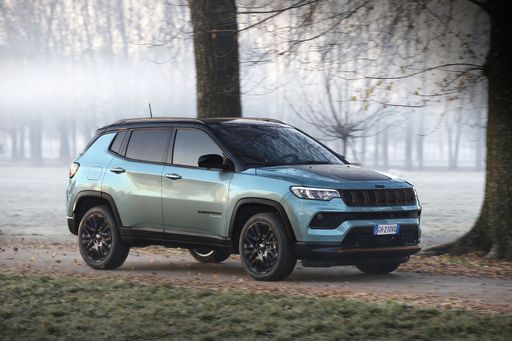 @ Jeep / Stellantis Media
@ Jeep / Stellantis Media
Jeep Compass
Costs and Consumption
View detailed analysis
Engine and Performance
View detailed analysis
Dimensions and Body
View detailed analysis
Jeep Compass
The Jeep Compass packs classic Jeep styling with a surprisingly composed demeanor, equally at home turning heads in the city or tackling a weekend dirt track. Inside it's a pragmatic, user-friendly compact SUV that prioritizes comfort and versatility — a smart pick if you want a dose of adventure without giving up everyday sense.
details @ Jeep / Stellantis Media
@ Jeep / Stellantis Media
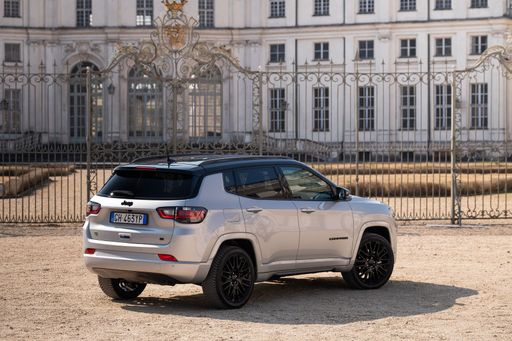 @ Jeep / Stellantis Media
@ Jeep / Stellantis Media
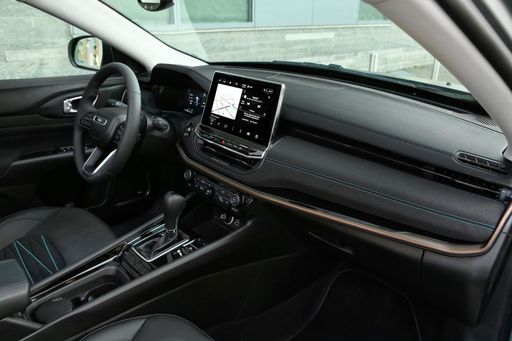 @ Jeep / Stellantis Media
@ Jeep / Stellantis Media
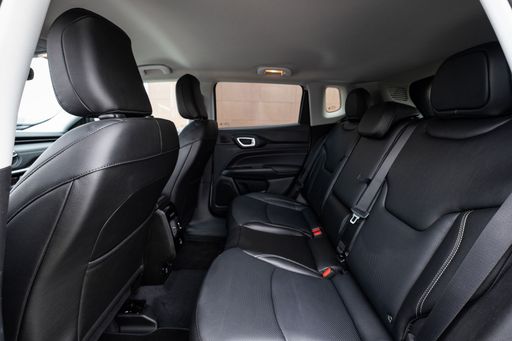 @ Jeep / Stellantis Media
@ Jeep / Stellantis Media
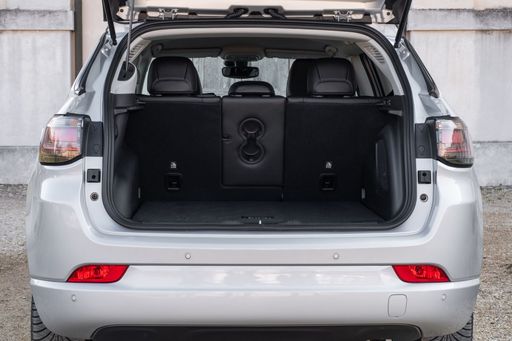 @ Jeep / Stellantis Media
@ Jeep / Stellantis Media
Suzuki Jimny
Brimming with raucous charm and unabashed off-road spirit, the Suzuki Jimny makes light work of rough tracks while remaining surprisingly at home in city streets. It's a cheeky, no-nonsense companion for buyers who prefer character over conformity — think go-anywhere attitude in a pocket-sized package.
details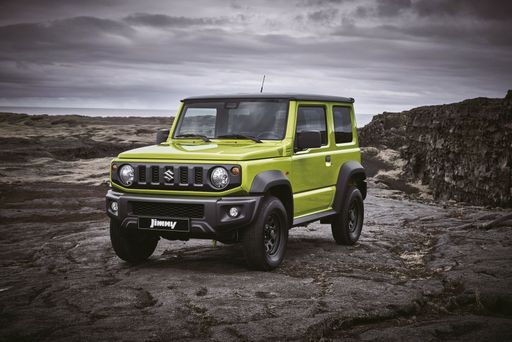 @ Suzuki Motor Corporation
@ Suzuki Motor Corporation
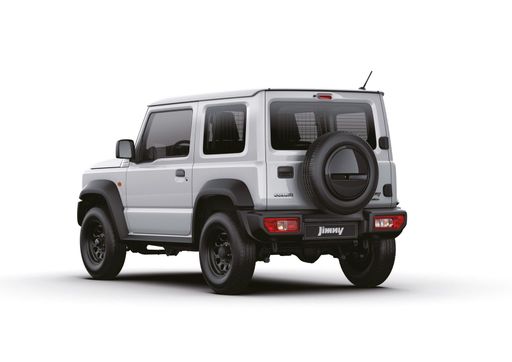 @ Suzuki Motor Corporation
@ Suzuki Motor Corporation
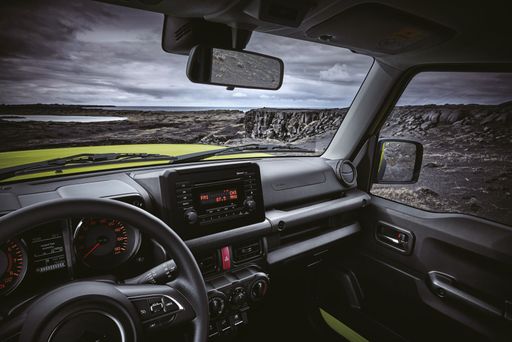 @ Suzuki Motor Corporation
@ Suzuki Motor Corporation
 @ Suzuki Motor Corporation
@ Suzuki Motor Corporation
 @ Jeep / Stellantis Media
@ Jeep / Stellantis Media
|
 @ Suzuki Motor Corporation
@ Suzuki Motor Corporation
|
|
|
|
Costs and Consumption |
|
|---|---|
|
Price
34200 - 43200 £
|
Price
25300 - 27700 £
|
|
Consumption L/100km
5.8 - 5.9 L
|
Consumption L/100km
7.70 L
|
|
Consumption kWh/100km
17.50 kWh
|
Consumption kWh/100km
-
|
|
Electric Range
500 km
|
Electric Range
-
|
|
Battery Capacity
74 kWh
|
Battery Capacity
-
|
|
co2
0 - 133 g/km
|
co2
173 g/km
|
|
Fuel tank capacity
55 L
|
Fuel tank capacity
40 L
|
Dimensions and Body |
|
|---|---|
|
Body Type
SUV
|
Body Type
Off-Roader
|
|
Seats
5
|
Seats
2
|
|
Doors
5
|
Doors
3
|
|
Curb weight
1667 - 2198 kg
|
Curb weight
1165 kg
|
|
Trunk capacity
550 L
|
Trunk capacity
-
|
|
Length
4552 mm
|
Length
3645 mm
|
|
Width
1928 mm
|
Width
1645 mm
|
|
Height
1675 mm
|
Height
1705 mm
|
|
Max trunk capacity
1561 L
|
Max trunk capacity
863 L
|
|
Payload
-
|
Payload
270 kg
|
Engine and Performance |
|
|---|---|
|
Engine Type
Petrol MHEV, Electric
|
Engine Type
Petrol
|
|
Transmission
Automatic
|
Transmission
Manuel
|
|
Transmission Detail
Dual-Clutch Automatic, Reduction Gearbox
|
Transmission Detail
Manual Gearbox
|
|
Drive Type
Front-Wheel Drive
|
Drive Type
All-Wheel Drive
|
|
Power HP
145 - 213 HP
|
Power HP
102 HP
|
|
Acceleration 0-100km/h
8.5 - 10.3 s
|
Acceleration 0-100km/h
12.80 s
|
|
Max Speed
180 - 188 km/h
|
Max Speed
145 km/h
|
|
Torque
230 - 345 Nm
|
Torque
130 Nm
|
|
Number of Cylinders
3 - 4
|
Number of Cylinders
4
|
|
Power kW
107 - 157 kW
|
Power kW
75 kW
|
|
Engine capacity
1199 cm3
|
Engine capacity
1462 cm3
|
General |
|
|---|---|
|
Model Year
2025
|
Model Year
2021 - 2024
|
|
CO2 Efficiency Class
D, A
|
CO2 Efficiency Class
F
|
|
Brand
Jeep
|
Brand
Suzuki
|
What drivetrain options does the Jeep Compass have?
The Jeep Compass is available as Front-Wheel Drive.
The prices and data displayed are estimates based on German list prices and may vary by country. This information is not legally binding.
